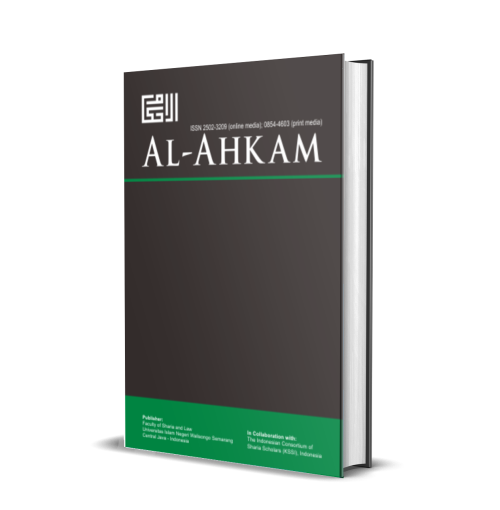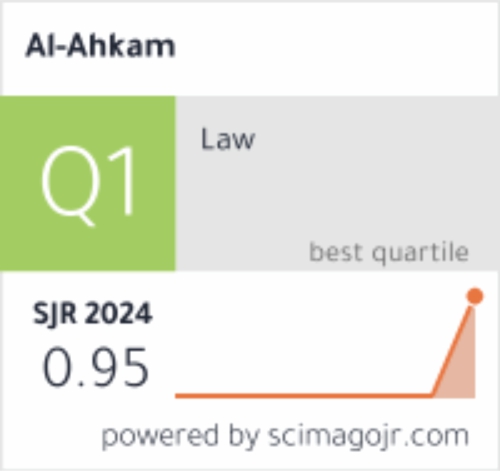FIKIH SOSIAL KIAI SAHAL SEBAGAI FIKIH PERADABAN
DOI:
https://doi.org/10.21580/ahkam.2014.24.1.130Keywords:
fikih sosial, uṣūl al-fiqh, peradaban, maṣlaḥahAbstract
Thought of ‘Fikih Sosial’ Kiai Sahal Mahfudh is a method to explore and respond to the dynamics of law in society. ‘Fikih Sosial’ is a model of fiqh development based maṣlaḥah oriented with a clear manhaj. As an embryo of ‘fikih peradaban’ (civilizing fiqh), ‘Fikih Sosial’ was based on the method of the underlying ideas of Moslem scholars (‘ulamā’), not a product of their thoughts. Therefore, to follow the method, may result the same product and the different one as well. The method is to contextualize ‘traditional authoritative book’ (al-kutub al-mu’tabarah) through the undestanding of the applications of rules of uṣūl al-fiqh or qawā’id al-fiqhiyyah. The development of masālik al-'illah theory is also urgent in accordance with producing fikih based maṣlaḥah al-'āmmah. In this position, fikih Kiai Sahal completely answers the problem of the integration of authenticity and modernity which are often contradictory and antagonisticDownloads
References
Amin, Ma’ruf, “Penjabaran Sistem Pengambilan Keputusan Hukum dalam Baḥth al-Masā’il di Lingkungan Nahdlatul Ulama sebagai hasil keputusan Munas Alim Ulama di Lampung”, makalah dalam halaqah Harlah NU ke-80 PWNU Jatim
di Pondok Pesantren Tebuireng, Jatim, tanggal 13 September 2003.
Ashmunī, Yāsīn, Ijtihād wa ’l-Taqlīd, Kediri: Hidāyah al-Ṭhullāb, t.th.
Bulqinī, Imam, Ghāyah Talkhīs al-Murād Hāmish Bughyah al-Mustarshidīn, Damaskus: Dār al-Ma’rifah, t.th.
al-Faki, Muḥammad Ḥāmid, Bulūgh al-Marām, Semarang: Pustaka Alawiyah, 2002.
al-Ḥanbaly, Abu Ishaq ibn Maflah, al-Mabdā’ fi Sharḥ al-Miqnā’, Beirut: al-Maktab al-Islamy, 1400 H.
Jurnal Taṣwirul Afkar, edisi No. 14 , Jakarta: PP Lakspesdam NU, 2003.
Sahal Mahfudh, “Fikih Sosial, Upaya Pengembangan Mazhab Qauli dan Manhaji,” Teks Pidato Penganugerahan Gelar Doktor Honoris Causa di UIN Syarif Hidayatullah Jakarta, 18 Juni 2003.
Mahfudh, Sahal, Nuansa Fikih Sosial, Yogyakarta: LKiS dan Pustaka Pelajar, 1994.
Mahfudh, Sahal, Pesantren Mencari Makna, Jakarta: Pustaka Ciganjur, 1999.
Misrawi, Zuhairi (ed.), Menggugat Tradisi: Pergulatan Pemikiran Anak Muda NU, Jakarta: Kompas-P3M, 2004.
al-Nawarī, Ḥasan Sulaimān dan Alawī ‘Abbās al-Māliki, Ibānat al-Aḥkām Sharaḥ Bulūgh al-Marām, Beirut: Dār al-Fikri, t.th.
al-Ṣan'ani, Imam Muḥammad ibn Isma'il ibn Amir al-Yamani, Subūl al-Salām Sharḥ Bulūgh al-Marām min Jam'i Asillatil Aḥkām, Juz 2, Riyādh: Maktabah Nazar Musṭafā al-Baz, 1995.
Shaṭa, Shaykh Abū Bakar, I’ānat al-Ṭālibīn, Juz 2, Beirut: Dār al-Fikr, t.th.
al-Thaqqāf, Shaykh Sayyid ‘Alawī ibn Aḥmad, Majmū’ah Sab’ah Kutubin Mufīdah Semarang: Usaha Keluarga, t.th.
al-Thaqqāf, Shaykh Sayyid ‘Alawī ibn Aḥmad, Tarṣiḥ al-Mustafidīn, Beirut: Darul Fikri, t.th.
Downloads
Published
How to Cite
Issue
Section
License
By submitting an article to the journal, the author(s) agree to transfer the published article's copyright to the journal, which will act as the publisher. This means the journal will have the right to publish the article in various forms, including reprints. The journal will maintain the publishing rights to the published articles.
In line with the license, authors and third parties (readers, researchers, and others) are allowed to share and adapt the material. In addition, the material must be given appropriate credit, provided with a link to the license, and indicated if changes were made. If authors remix, transform or build upon the material, authors must distribute their contributions under the same license as the original.




